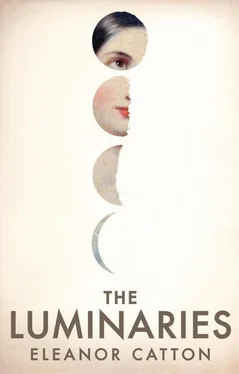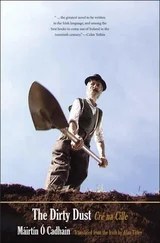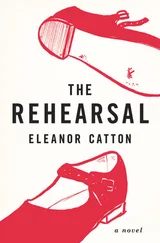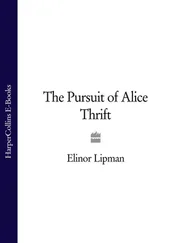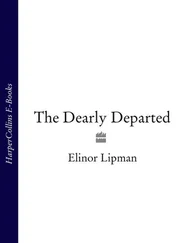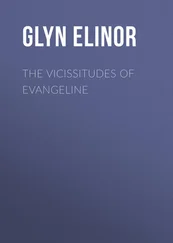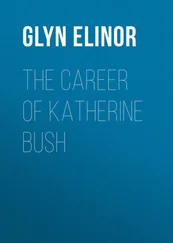At the Reserve Bank he produced his kid pouch of dust, and, at the banker’s request, surrendered its contents to be examined and weighed. The valuation took some time, but the eventual price offered was a good one, and Staines left the building with a paper note made out for twenty pounds folded in his vest pocket, against his heart.
‘Stop you there, lad.’
Staines turned. On the steps of the bank, just rising, was a sandy-haired man, perhaps fifty in age. His skin was very weathered, and his nose very red. He sported a patchy week-old beard, the stubble of which was quite white.
‘Can I help you?’ said Staines.
‘You can answer me a couple of questions,’ said the man. ‘Here’s the first. Are you a Company man?’
‘I’m not a Company man.’
‘All right. Here’s the second. Honesty or loyalty?’
‘Excuse me?’
‘Honesty or loyalty,’ said the man. ‘Which do you value higher?’
‘Is this a trick?’
‘A genuine inquiry. If you wouldn’t mind.’
‘Well,’ said Staines, frowning slightly, ‘that’s very difficult to say—which to value higher. Honesty or loyalty. From a certain point of view one might say that honesty is a kind of loyalty—a loyalty to the truth … though one would hardly call loyalty a kind of honesty! I suppose that when it came down to it—if I had to choose between being dishonest but loyal, or being disloyal but honest—I’d rather stand by my men, or by my country, or by my family, than by the truth. So I suppose I’d say loyalty … in myself. But in others … in the case of others, I feel quite differently. I’d much prefer an honest friend to a friend who was merely loyal to me; and I’d much rather be loyal to an honest friend than to a sycophant. Let’s say that my answer is conditional: in myself, I value loyalty; in others, honesty.’
‘That’s good,’ said the man. ‘That’s very good.’
‘Is it?’ said Staines, smiling now. ‘Have I passed some kind of a test?’
‘Almost,’ said the man. ‘I’m after a favour. In good faith—and on your terms. Look here—’
He reached into his pocket and withdrew a nugget, around the size of a short cigar. He held it up, so that it caught the light. ‘Nice, isn’t it?’
‘Very nice,’ said Staines, but he was no longer smiling.
The man continued. ‘Picked this up in the Clutha Valley. Otago way. Been carrying it about for a month—two months—but I’m wanting to turn it into land, you see—got my eye on a patch of land—and the land agent won’t touch anything but paper money. Here’s the problem. I’ve been robbed. Got no proof of my own identity. My papers, my miner’s right. Everything’s gone. So I can’t bank this nugget on my own accord.’
‘Ah,’ said Staines.
‘What I’m after is a favour. You take this nugget into the bank. Say it’s your own—that you found it, on Crown land. Change it into paper money for me. It wouldn’t take you half an hour, all up. You can name your price.’
‘I see,’ said Staines, uncertainly. He hovered a moment. ‘Surely,’ he said, ‘you might simply explain your situation to the fellows inside. You might tell them that you’ve been robbed—as you’ve just told me.’
‘I can’t do that,’ said the man.
‘There are always records,’ said Staines. ‘Even if you don’t have your papers, they’ll have other ways of tracking who you are. The shipping news and so forth.’
The man shook his head. ‘I was on an Otago certificate,’ he said, ‘and I never came through the customhouse when I arrived. There’s no record of me here.’
‘Oh,’ said Staines—who was beginning to feel very uncomfortable.
The man stepped forward. ‘I’m telling you a straight story, lad. The nugget’s mine. Picked it up in the Clutha Valley. I’ll sketch the place for you. I’ll draw you a bloody map. My story’s straight.’
Staines looked again at the nugget. ‘Can anyone vouch for you?’ he said.
‘I haven’t gone waving this about,’ the man snapped, shaking his fist. ‘Where would be the sense in that? I’ve been robbed already; I won’t be robbed again. There’s only one soul on earth who’s touched this piece besides me. Young woman by the name of Anna Wetherell. She’d vouch for the truth of what I’m telling you; but she’s in Dunedin, isn’t she, and I can’t stand about waiting for the post.’
The name Anna Wetherell meant nothing to Staines, and he registered it only dimly as he considered the best way to withdraw. The man’s story was not at all convincing (it seemed obvious to Staines that the nugget had been stolen, and that the thief, fearing capture, was now attempting to cover his tracks by employing an innocent third man to turn the evidence to untraceable cash) and his countenance did not reassure. He had the weary, bloodshot look of a man long since ruined by drink; even at a distance of several paces, Staines could smell yesterday’s liquor on his clothes and on his breath. Stalling for time, he said, ‘Land agent, did you say?’
The man nodded. ‘There’s an acreage I’m keen on. Arahura way. Timber, that’s the business. I’m through with chasing gold. I had a fortune, and now it’s gone, and that’s the end of the game as far as I’m concerned. Timber—that’s honest work.’
‘What’s your name?’
‘Crosbie Wells,’ said the man.
Staines paused. ‘Wells?’ he said.
‘That’s right,’ said the man. Suddenly he scowled. ‘What’s it to you?’
Staines was remembering the strange injunction that Francis Carver had given him at the Hawthorn Hotel in George-street, one month prior: ‘Just for today,’ he had said, ‘my name’s Wells. Francis Wells.’
‘ Crosbie Wells,’ Staines repeated now.
‘That’s it,’ said Wells, still scowling. ‘No middle name, no nickname, no alias, nothing but plain old Crosbie Wells, ever since the day I was born. Can’t prove it, of course. Can’t prove a d—ned thing, without my papers.’
Staines hesitated again. After a moment he put out his hand and said, ‘Emery Staines.’
Wells transferred the nugget to his other hand, and they shook. ‘Care to name your price, Mr. Staines? I’d be very much obliged to you.’
‘Listen,’ said Staines suddenly. ‘You don’t happen to know—I mean, forgive me, but—you don’t happen to know a man named Francis Carver?’
For he still did not know the full story of what had happened on the day before he left Dunedin—where Carver had gone that afternoon; why he had chosen to assume an alias; why he had afforded such importance to a small chest containing nothing but five unremarkable gowns.
Wells had stiffened. He said, in a voice that was newly hard, ‘Why?’
‘I’m very sorry,’ said Staines. ‘Perhaps it’s of no consequence. I only ask because—well, about a month ago, a man named Carver took on your surname—just for an afternoon—and never told me why or what for.’
Wells’s hands had balled into fists. ‘What’s Carver to you?’
‘I don’t know him well,’ said Staines, taking a step back. ‘He stood me some money, that’s all.’
‘What kind of money? How much?’
‘Eight pounds,’ said Staines.
‘What?’
‘Eight,’ said Staines, and then, again, ‘Eight pounds.’
Wells advanced on him. ‘Friend, is he?’
‘Not in the least,’ said Staines, stepping back again. ‘I found out later that he was a con—that he’d served ten years, with labour—but it was too late by then; I’d signed.’
‘Signed what?’
‘A sponsorship agreement,’ said Staines.
‘And he signed in my name.’
‘No,’ said Staines, putting up his hands, ‘he only used it—your name, I mean—but I don’t know what for. Look, I’m ever so sorry to distress you—’
Читать дальше
